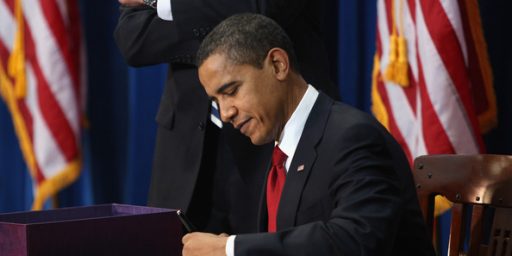Fiscal Stimulus Lag
One thing people seem not to factor into the discussions of what should be done about the current economic crisis is the lags associated with fiscal policy. Now we have this article about a report from the CBO detailing precisely that point (sorry can’t seem to find the actual article on the CBO website).
The findings, released to lawmakers Sunday, call into question the effectiveness of congressional Democrats’ efforts to pump up the economy through old-fashioned public works projects like roads, bridges and repairs of public housing.
Less than half of the $30 billion in highway construction funds detailed by House Democrats would be released into the economy over the next four years, concludes the analysis by the Congressional Budget Office. Less than $4 billion in highway construction money would reach the economy by September 2010.
[…]
The CBO analysis doesn’t cover tax cuts or efforts by Democrats to provide relief to cash-strapped state governments to help with their Medicaid bills. But it illustrates just how difficult it can be to use public investment to rush money into the economy. It usually takes bids and contracts to announce such developments, which invariably take time.
Overall, only $26 billion out of $274 billion in infrastructure spending would be delivered into the economy by the Sept. 30 end of the budget year, just 7 percent. Just one in seven dollars of a huge $18.5 billion investment in energy efficiency and renewable energy programs would be spent within a year and a half.
And other pieces, such as efforts to bring broadband Internet service to rural and underserved areas won’t get started in earnest for years, while just one-fourth of clean drinking water projects can be completed by October of next year.
In other words it is looking like Obama’s fiscal stimulus plan is nothing more than a pile of pork loaded down with spending that most likely take effect after the current recession ends.
Or to put it another way, a significant chunk of the stimulus package could simply be cut out with little to no impact on the current economic situation. How much? About 1/3rd of it or $274 billion. But we are supposed to believe that Obama is going to practice fiscal restraint…in the future. Right.
Via Greg Mankiw.





I got to give it to naysayers- if O proposed a limited program, say like Clinton did with a 100,000 new policemen funded for two years-people will criticize the program because it was not properly funded- so know the president does fund a program for longer (BTW: how long did it take to build the Wilson bridge) and voila- new criticism- let’s be real here- anything and everything can be criticized. Now – I love the non-sequitur that O is not interested in ending the recession because you just do not happen to agree with him- I wonder if you thought we were in a recession a year ago. I prefer to just use my intellectual acuity and observe and profess what many economist are saying: we simply are not sure what would work best- specially when most monetary tools have been used by the prior administration. Some humility is in order.
I’m glad you brought this up, Steve, since it save me the trouble. Seems to me the reasonable course of action is to abandon the non-productive 1/3. If it’s needed later, it can be done later. Honestly, I think that anything that can’t be fully disbursed in 2009 ought to be scrapped as counter-productive.
Adding to the interest burden isn’t just unproductive.
You want to know what will work? Try the Fair Tax. People will get to keep their whole paycheck. Corporations do away with income taxes, compliance costs and all other federal income tax costs. 16 trillion dollars parked offshore would come home. Give it a read. It can work.
Raoul,
Read Dave Schuler’s post. Twice. Then flip the switch on the back of your head to turn on your brain.
Pete,
If you are talking about Hall and Rabushka’s fair tax then you are preaching to the choir here…at least with regards to me.
Dave and Steve (and I know you already know this) – the 1/3 (at least) of the package is the tolling cost of a government intervention. By its very nature, it is not optimized, it is burdened with the political cost.
I love quips. The best relevant one is Milton Friedman’s (paraphrased from memory) – “I know I’m paying two dollars for every dollar of defense I get, after all its the government. But what is the alternative?”
This inefficiency, or tolling cost, is one of the prime arguments for minimizing the role of government. And in the current situation, I believe there is an alternative…….and this “stimulus package” is a travesty.